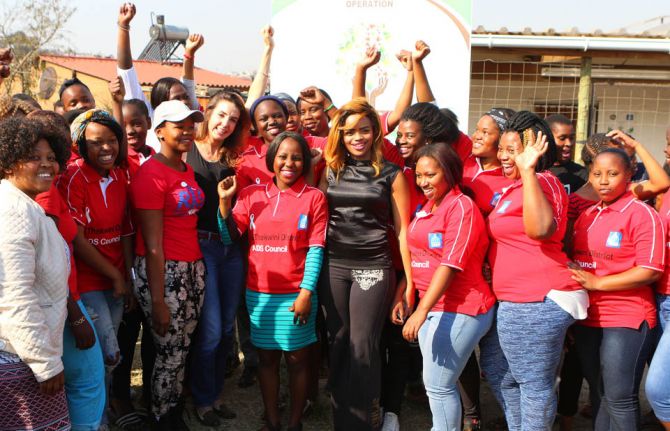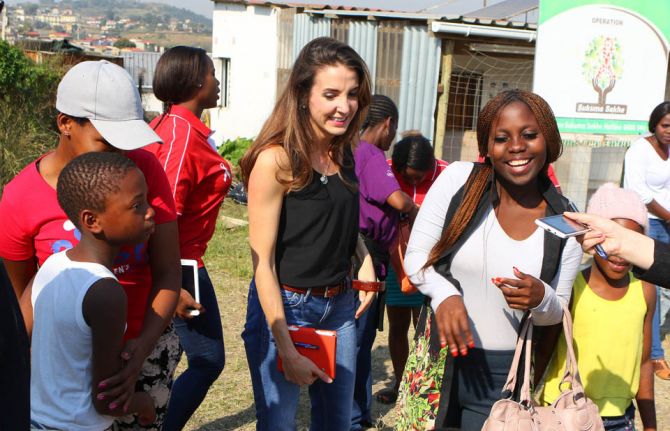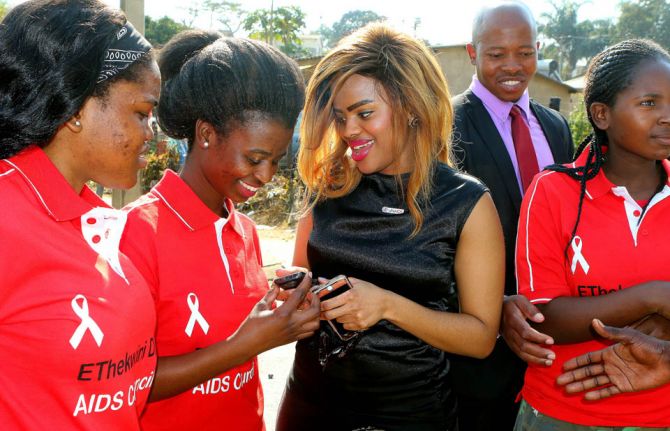



Update
Princesses learn first-hand the realities faced by young women growing up in South Africa
05 October 2016
05 October 2016 05 October 2016Adolescent girls with Rise Young Women’s Club emblazoned on their bright red polo shirts sang and danced to welcome the delegation visiting the community centre of Ward 11, a small township of more than 40 000 people on the outskirts of Durban, South Africa. The community centre is part of the province’s innovative Operation Sukuma Sakhe and acts as the hub for coordinating community-based health, social and educational outreach activities in the ward—the smallest division in South Africa’s governmental structure.
The Rise Young Women’s Club uses the centre as a base from which to engage, empower and support adolescent girls and young women in their community to grow up healthy and safe. The club organizes weekly meetings to discuss the challenges that young women and adolescent girls face at home, at school and in the community and stages plays and community dialogues to educate the broader community. As an offshoot of the popular Soul City infotainment campaign, they follow a weekly soap opera on TV with materials that help support their discussions around HIV, sexual and reproductive health and rights, gender equality and violence against women.
The principals in the visiting delegation were Princess Tessy of Luxembourg, who is UNAIDS Global Advocate for Young Women and Adolescent Girls, and Princess Sikhanyiso of Swaziland, who recently spoke passionately about gender inequality at the United Nations General Assembly High-Level Meeting on Ending AIDS. The princesses travelled to South Africa for a joint visit before the start of the 21st International AIDS Conference in order to learn more about how HIV is affecting the lives of young women and adolescent girls in South Africa.
The princesses visited the packed one-room centre to hear the ward counsellor explain the main challenges affecting the community—unemployment, community safety, inadequate education and teenage pregnancy. Rise Young Women’s Club members moved the audience by disclosing their first-hand experiences of school exclusion, family and community rejection, gender-based violence and lack of opportunities for personal development. However, their close peer support and empowerment through the club was clear. Club members invited the delegation to walk to their homes in the informal settlements surrounding the community centre, where they met their families and neighbours to gain a deeper understanding of the daily realities of growing up in peri-urban South Africa.
The Rise Young Women’s Club and its staff provide essential mentoring and motivation for young women and adolescent girls in the community through an innovative peer education and support group model.Unfortunately, long-term support for the programme has not been secured.
One-stop care centre
The next visit was to the Mahatma Gandhi Memorial Regional Hospital, known for its one-stop care centre—the Thuthuzela centre—for people who have been subjected to rape or gender-based violence South Africa has one of the highest rates of gender-based violence in the world. The Mahatma Gandhi Thuthuzela care centre hospital alone processes more than 120 rapes cases per month, mostly young women and children. prides itself in turning victims into survivors. The self-contained centre, which is set away from the main hospital in order to ensure confidentiality and promote a safe and comforting environment, takes direct referrals from police stations in the district 24 hours a day.
Specially trained nursing staff, police officers, doctors, counsellors and social workers are on hand to provide all the immediate medical, forensic and support services needed, minimizing the trauma for victims in the immediate post-violence period and helping to ensure rapid recovery and resolution for each individual. They cover the big issues, but take care to look after the small details—teddy bears, big and small, and a plethora of toys lie in a box by the examination rooms to comfort child victims or the victim’s children.
By coordinating the work of medical staff, police and the prosecution authority, the centre also helps to ensure that the correct evidence is collected and proceduresare followed to secure the conviction of the perpetrators.
Help my sisters
The final visit for the princesses was the TB/HIV Care Association’s Durban office, a comprehensive wellness programme for sex workers with an emphasis on peer counselling. Their two vans, turned into mobile health clinics, cruise the bustling streets of Durban distributing condoms, offering testing for HIV and other sexually transmitted infections and providing treatment and referrals.
Getting ready to go out on an outreach visit, one of the outreach team members explained that like many of her peer educator colleagues she used to engage in risky sexual behaviour in order to increase income when work was slow, putting her at a much greater risk of HIV infection and other sexually transmitted infections.
Since 2011, the TB/HIV Care Association has provided health screening and preventive services through a multidisciplinary team made up of nurses, social workers, sex workers and volunteers, reaching more than 20 000 sex workers across five sites in South Africa—a feat the Durban site manager, Robin Ogle, is particularly proud of considering the high HIV prevalence among female sex workers in South Africa which ranges between 40 to 60% depending on the region. Trained as a nurse with 18 years of hospital work under her belt, she has witnessed a marked improvement in the health and well-being of sex workers under her care. Noting that building relationships with sex workers had been key, she showed the UNAIDS delegation the in-house pharmacy and the “friendly rooms”, a seal of approval reassuring patients that the health-care staff are non-judgemental and that everyone will be treated with dignity. Part of the DREAMS initiative, funded by the United States President’s Emergency Plan for AIDS Relief, the centre in Durban has just started a pilot project to provide access to pre-exposure prophylaxis (PrEP) for sex workers. To date, 44 women have been given access to PrEP through the centre since June 2016.
Quotes
“What an incredible experience to see and hear so many different people’s life stories and to see how so many work so closely within the communities. Thank you for trusting us and opening up.”
“This trip has opened my eyes to a life very different from my own and it has made me realize the many, many challenges young women face.”
“I sit in an office working on countless reports and statistics and cold hard facts far removed from the reality of the field, so this day allowed me to grow professionally and spiritually.”
“Because time is money, many lack basic knowledge which is why I am here to help my sisters.”
“I am a young sex worker but I have dreams too.”



